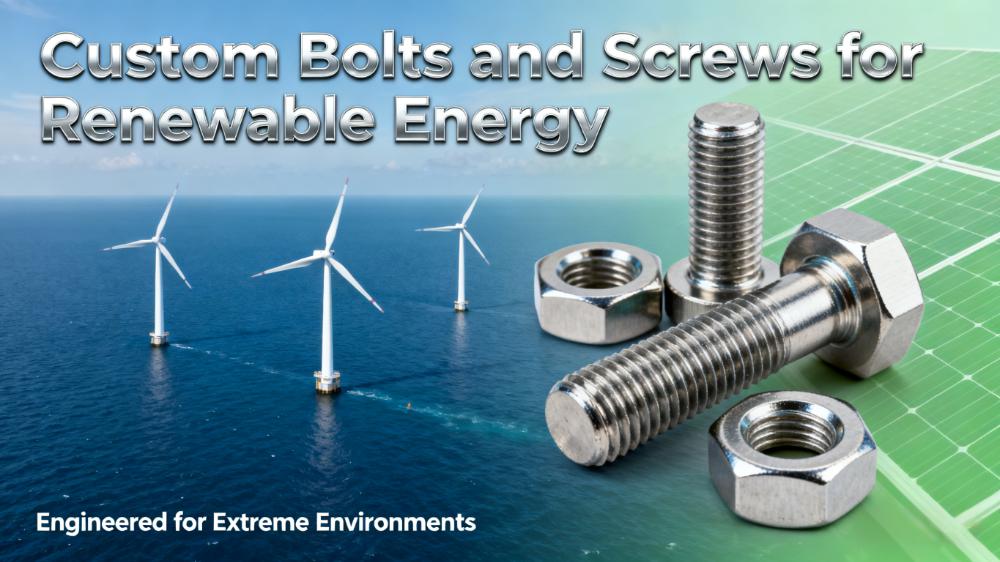As renewable energy continues to expand globally, the demand for high quality fastening solutions has never been greater. From solar farms to offshore wind turbines, reliable and durable stainless steel fasteners play a critical role in ensuring the safety and long-term performance of energy systems. In particular, the wind energy industry depends heavily on custom bolts and screws designed to handle extreme environmental and mechanical stresses.

The Role of Fasteners in Renewable Energy
Every component in a renewable energy project contributes to efficiency and safety. Fastener manufacturers are responsible for producing critical components like bolts, screws, and lock nuts that must withstand constant vibration, temperature changes, and exposure to corrosive environments.
For instance, in wind turbine applications, fasteners secure parts such as the turbine blade, nacelle, and tower sections. Any failure in these fastening systems could lead to costly downtime or even catastrophic damage. That’s why choosing the right fastening solutions is vital for both onshore and offshore installations.
Why Custom Bolts and Screws Are Essential
Standard fasteners often fail to meet the specific requirements of wind energy and other renewable energy projects. Custom bolts and screws are engineered to precise tolerances and made from materials that deliver superior corrosion resistance and long-term durability.
High-grade stainless steel fasteners are especially valued for their ability to resist rust and fatigue under extreme weather conditions. By partnering with experienced fastener manufacturers, energy companies can ensure each component meets international quality standards and performs reliably over decades of service.
Materials and Coatings for Long-Term Performance
In renewable energy installations, corrosion resistance is one of the most important factors. Offshore wind turbines, for example, operate in saltwater environments that accelerate metal degradation. Therefore, materials such as 316 stainless steel or other corrosion-resistant alloys are preferred for bolts, screws, and lock nuts.
Specialized surface treatments like hot-dip galvanizing, zinc-nickel plating, or organic coatings can further extend the lifespan of fasteners used in harsh conditions. These enhancements ensure long-term structural integrity, reduce maintenance costs, and improve the overall efficiency of the energy system.
Partnering with Reliable Fastener Manufacturers
When selecting a supplier for renewable energy projects, it’s crucial to work with fastener manufacturers who understand the unique demands of the industry. A reliable manufacturer can provide custom fastening solutions tailored for specific turbine models or environmental conditions.
From the turbine blade connection to the foundation bolts, precision engineering and stringent quality control help ensure that each fastener performs flawlessly throughout the turbine’s operational life.
FAQs
1. Why are custom fasteners important for renewable energy projects?
Custom fasteners ensure precise fit, higher strength, and better corrosion resistance, which are critical for the demanding conditions of wind energy and solar power systems.
2. What materials are best for wind turbine fasteners?
316 stainless steel fasteners and other corrosion-resistant alloys are ideal due to their durability and ability to perform in corrosive environments such as offshore locations.
3. How do fastener coatings improve performance?
Protective coatings like galvanizing or zinc-nickel plating add an extra layer of protection, enhancing long-term durability and reducing maintenance needs.
4. What types of fasteners are used in wind turbines?
Common fasteners include custom bolts, screws, and lock nuts that secure the turbine blade, tower, and internal components against vibration and load stress.
Conclusion
The success of modern renewable energy infrastructure depends not only on advanced turbine technology but also on the integrity of the critical components holding everything together. Custom bolts and screws designed for wind energy applications provide the strength, corrosion resistance, and reliability needed for long-term operation.
By investing in high quality stainless steel fasteners, developers and engineers can build more durable, efficient, and sustainable energy systems for the future.
